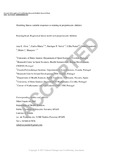Mostrar el registro sencillo del ítem
Modeling fitness variable responses to training in prepubescent children
| dc.creator | Alves, Ana R. | es_ES |
| dc.creator | Marta, Carlos C. | es_ES |
| dc.creator | Neiva, Henrique P. | es_ES |
| dc.creator | Nunes, Célia | es_ES |
| dc.creator | Izquierdo Redín, Mikel | es_ES |
| dc.date.accessioned | 2021-02-19T08:12:08Z | |
| dc.date.available | 2021-08-01T23:00:11Z | |
| dc.date.issued | 2020 | |
| dc.identifier.issn | 1533-4287 (Electronic) | |
| dc.identifier.uri | https://hdl.handle.net/2454/39264 | |
| dc.description.abstract | The aim of this study was to determine strength and oxygen uptake (V[Combining Dot Above]O2max) performances according to different training program intervention design with 8-week duration in prepubescent children through a multiple linear regression models. Two hundred forty-five healthy prepubescent children (aged 10.9 ± 0.5 years) were randomly assigned to a specific training program (strength training only-S; aerobic training only-A; intrasession aerobic and strength training-AS; intrasession strength and aerobic training-SA; or concurrent training performed in different sessions-CT) or a control group (no training regimen-C). It was possible to develop indirect predictive models for each training method, by including each variable pretraining, body fat percentage and body mass index. The models provided explained 82% of variance in the V[Combining Dot Above]O2max, 98% in the 1 kg ball-throw, 96% in the 3 kg ball-throw, 92% in the countermovement jump, 93% in the standing long jump and 98% in the 20 m sprint performances. This novel approach to training evaluation and control aims to provide a tool to allow professionals to calculate changes with a high confidence level (CI 95%), to control gains and to choose the best training methodology to apply according to the defined purposes. The results of this study could be a great support to teachers, coaches, and professionals providing important tools to improve the efficacy and individualization of training. | en |
| dc.description.sponsorship | This project was supported by the National Funds through FCT – Portuguese Foundation for Science and Technology (UID/DTP/04045/2013) – and the European Fund for Regional Development(FEDER) allocated by European Union through the COMPETE 2020 Programme (POCI-01-0145-FEDER-006969) – competitiveness and internationalization (POCI). | en |
| dc.format.extent | 26 p. | |
| dc.format.mimetype | application/pdf | en |
| dc.language.iso | eng | en |
| dc.publisher | Lippincott, Williams & Wilkins | en |
| dc.publisher | National Strength and Conditioning Association | en |
| dc.relation.ispartof | Journal of Strength and Conditioning Research, 2020, 34(8), 2352-2359 | en |
| dc.rights | © 2020 © 2017 National Strength and Conditioning Association | en |
| dc.subject | Concurrent training | en |
| dc.subject | Explosive | en |
| dc.subject | Linear regression | en |
| dc.subject | Youth | en |
| dc.title | Modeling fitness variable responses to training in prepubescent children | en |
| dc.type | info:eu-repo/semantics/article | en |
| dc.type | Artículo / Artikulua | es |
| dc.contributor.department | Ciencias de la Salud | es_ES |
| dc.contributor.department | Osasun Zientziak | eu |
| dc.rights.accessRights | info:eu-repo/semantics/openAccess | en |
| dc.rights.accessRights | Acceso abierto / Sarbide irekia | es |
| dc.embargo.terms | 2021-08-01 | |
| dc.identifier.doi | 10.1519/JSC.0000000000002201 | |
| dc.relation.publisherversion | https://doi.org/10.1519/JSC.0000000000002201 | |
| dc.type.version | info:eu-repo/semantics/acceptedVersion | en |
| dc.type.version | Versión aceptada / Onetsi den bertsioa | es |


